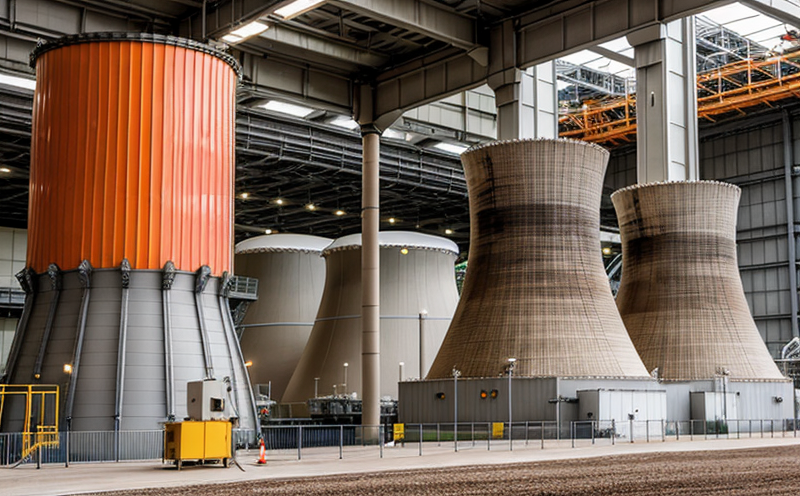ISO 12737 Fracture Toughness of Nuclear Cladding Steels
The ISO 12737 standard is a critical benchmark for ensuring the integrity and safety of nuclear cladding steels used in nuclear power plant construction. This service focuses on the specific testing requirements outlined by this international standard, which are designed to assess the fracture toughness properties of these materials under extreme conditions.
Nuclear cladding steels play a crucial role in protecting the reactor core from radiation damage and ensuring long-term reliability. The integrity of these components is paramount, as any failure could have catastrophic consequences. Therefore, compliance with ISO 12737 ensures that nuclear power plant manufacturers adhere to stringent quality control standards.
The testing process involves subjecting specially prepared specimens to controlled environments simulating the operational conditions they will encounter in a reactor core. This includes high radiation levels and mechanical stresses. The fracture toughness of these materials is determined by measuring how they respond to applied stress, particularly under neutron irradiation, which can significantly alter material properties.
Our laboratory adheres strictly to ISO 12737 guidelines, ensuring accurate and reliable results that are essential for compliance with regulatory requirements and industry best practices. We utilize state-of-the-art equipment capable of replicating the rigorous conditions specified in this standard, providing clients with confidence in the performance of their materials.
The process begins with meticulous specimen preparation, followed by testing under carefully controlled parameters to simulate real-world conditions. Our team of experts ensures that each step is conducted with precision and adherence to international standards, resulting in comprehensive test reports that provide valuable insights into material behavior.
Understanding the fracture toughness of nuclear cladding steels helps manufacturers optimize their designs for better durability and safety. This service not only meets but exceeds compliance requirements, offering added value through deep technical expertise and industry-leading capabilities.
The results from our testing can inform critical decisions in reactor design, material selection, and component manufacturing, ultimately contributing to the safe operation of nuclear power plants worldwide.
Industry Applications
| Application | Description |
|---|---|
| Nuclear Power Plant Construction | Ensuring the integrity of cladding steels used in reactor cores. |
| Material Quality Control | Verifying compliance with ISO 12737 standards to ensure safe operation. |
| R&D for Material Improvement | Testing new materials and modifications to existing ones under realistic conditions. |
| Component Manufacturing Optimization | Determining the optimal parameters for manufacturing cladding steels that meet strict standards. |
| Regulatory Compliance Verification | Ensuring adherence to international regulations and best practices in nuclear technology. |
| Supplier Evaluation | Evaluating suppliers' products against ISO 12737 requirements for quality assurance. |
| Accident Scenario Analysis | Simulating worst-case scenarios to enhance reactor safety measures and design improvements. |
| Life Extension Programs | Evaluating the aging effects on cladding steels through rigorous testing and analysis. |
Eurolab Advantages
At Eurolab, we pride ourselves on providing unparalleled expertise in nuclear materials testing. Our team of highly qualified professionals ensures that every test conducted adheres to the highest standards of accuracy and reliability.
We offer a comprehensive suite of services tailored specifically for nuclear power plant materials and components testing, including ISO 12737 compliance. This includes not only the mechanical testing but also the development of custom test procedures where necessary.
Our state-of-the-art facilities are equipped with cutting-edge technology that allows us to replicate the most challenging conditions faced by nuclear cladding steels. This ensures that our clients receive precise and actionable data, which is crucial for maintaining safety and efficiency in their operations.
In addition to our technical capabilities, we also provide detailed reports that offer insights into material behavior under various stress conditions. These reports are invaluable tools for decision-makers looking to optimize their products or processes further.
By choosing Eurolab, clients gain access to a wealth of experience and knowledge in nuclear materials testing. Our commitment to excellence ensures that our services not only meet but often exceed the expectations set forth by international standards like ISO 12737.
International Acceptance and Recognition
The ISO 12737 standard is widely recognized for its rigorous testing procedures, which are essential in ensuring the safety and reliability of nuclear cladding steels. This international recognition underscores the importance of this service in the global nuclear industry.
Countries around the world have adopted this standard as a benchmark for quality control in nuclear power plant construction. Regulatory bodies rely on ISO 12737 results to verify that materials meet stringent safety requirements, thereby promoting trust and confidence among stakeholders.
The acceptance of this standard extends beyond national borders, fostering collaboration between countries and organizations involved in the design, manufacturing, and operation of nuclear power plants. This global consensus ensures a consistent approach to testing and evaluation, which is critical for maintaining high standards across the industry.
Our laboratory plays an integral role in supporting this international effort by providing accurate and reliable test results that align with ISO 12737 specifications. By adhering strictly to these guidelines, we contribute to the overall safety and efficiency of nuclear power plants worldwide.





